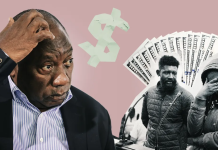By Tileni Mongudhi | 14 August 2015
Namibian authorities are frantically working to verify whether terrorist cells linked to al-Qaeda and its offspring, the al-Shabaab are using the country as a springboard for their activities.
The Namibian has learnt that authorities have been monitoring suspected terrorist activities in the country and discovered that a number of
terrorist cells might be operating in Windhoek and Rehoboth.
Although sources said Namibian intelligence, police and the prosecutor general’s office are working together to investigate possible terrorist
agents operating in the country, prosecutor general Martha Imalwa denied that her office was involved in such investigations.
Sources within the law enforcement agencies said suspected terrorist cells have been operating in the Rehoboth and Windhoek
areas. Key suspects are reportedly migrants from Ethiopia, Somalia and Kenya, whom authorities believe use Namibia because they
are not easily detected.
The suspected terrorists enter Namibia by road, mainly from South Africa. Some remain in the country and end up being deported due
to their questionable residence permits.
Others, authorities said, use Air Namibia’s direct flights to Frankfurt, Germany then make their way to Turkey and disappear.
An example cited is the case of Ibrahim Mohamed Abdil, who was arrested in December 2013 while trying to leave the country for Frankfurt using a fake passport.
A source said Abdil decided to cooperate with the authorities and revealed that he was heading to Europe with his final destination being Turkey.
Abdil then told authorities that his contacts in Namibia were a Somali Mohamednoor Hussein Ibrahim and Ethiopian Abraham Tadesse Belay.
The two allegedly have links with the terrorist group al-Shabaab.
When Ibrahim and Belay were arrested in Windhoek in January 2014, police found them with fake Kenyan drivers’ licences.
The two claimed they were in the country on business but it was not clear what they traded in.
They were then charged under the Organised Crime Act, with the main charge being smuggling of migrants into Namibia.
During their court appearance and bail applications, the prosecutor general’s office informed the court that the two had to remain in custody because the state was in the process of investigating whether they were part of a syndicate involved in terrorist activities.
During May this year, Ibrahim and Belay were released after spending 17 months in police custody.
The state withdrew its case against them because Abdil could not be found.
Sources said additional statements were required from Abdil to finalise the case against the two but at the time the prosecution
was informed that police had taken Abdil’s case to the Immigration Control Board which decided to deport him to South Africa where he held a refugee status.
Before he was deported, Abdil had pleaded guilty having been smuggled into the country. After he was deported, Namibian police reportedly could not locate him in South Africa to record additional statements which would have strengthened the state’s case against Ibrahim and Belay.
Sources said this is just one of the many cases which show that Namibia is being used as a hub by terrorist organisations and that the smuggling of suspicious people into the country involves employees of bed and breakfast establishments as well as employees of the national carrier Air Namibia.
The Namibian has also learnt that due to Namibian authorities’ lack of interest to further investigate cases, many of those suspected of having links with terrorist groups end up being deported with no further efforts to break the operations within the country.
Police deputy commissioner Sydney Philander, the head of the special and high profile crimes unit, was responsible for investigating Ibrahim and Belay.
He said his unit was investigating the two for human trafficking. He said his unit’s investigation did not touch on terrorism because investigating terrorism related cases does not fall under his jurisdiction.
In August 2013, The Namibian reported that government was investigating a case in which one Lutheran pastor married 14
Pakistani nationals and one Egyptian to Namibian women within a space of five months in Otjiwarongo.
Suspicions were raised after the discovery that all the men were Muslim but they opted to engage a Lutheran pastor to conduct their marriages.
These marriages of convenience allowed the dubious men to stay in the country.
The pastor’s marriage officer licence was revoked by the Ministry of Home Affairs and Immigration.






